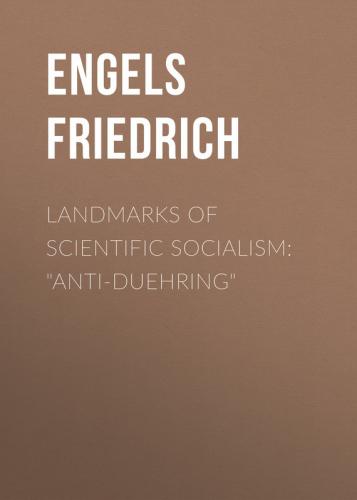But this is a means of distinguishing quality and after a discussion of this part of the subject we proceed "Over against the idea of species stands the idea of the whole, a homogeneity, as it were, in which no differentiation of species can longer be found," so we pass from quality to quantity and this is always "capable of measurement."
Let us compare this "clear analysis of the actual, universal scheme of things" and its "real, critical standpoint" with the fever-phantasies of a Hegel. We find that Hegel's "Logic" begins with existence as does that of Herr Duehring; that existence displays itself as nothing, as with Herr Duehring; that out of this not-being, a leap is made into being, and that existence is the result of this, that is a more complete and higher form of being, as with Herr Duehring. Being leads to quality, quality to quantity, just as with Herr Duehring. And in order that no essential shall be lacking Herr Duehring tells us elsewhere "from the realm of absence of sensation man leaps to that of sensation in spite of all the quantitative steps with but one qualitative leap … from which we can show that he is entirely differentiated from the mere gradation of one and the same quality." This is just the Hegelian standard of measurement according to which mere quantitative expansion or contraction causes a sudden qualitative change at a given point, as for example with heated or cooled water, there are points where the spring into a new set of conditions is fulfilled under normal circumstances, and where therefore quantity suddenly changes into quality.
Our investigation has likewise sought to penetrate to the deepest roots, and discovers the rooted Duehring foundations to be the "fever-phantasies" of a Hegel, the categories of the Hegelian logic, in the first place, teachings in regard to existence after the antique Hegelian method, and an ineffective cloak of plagiarism.
And not content with purloining the whole scheme of existence from his despised predecessors, Herr Duehring after giving the above example of a change of quantity into quality has the coolness to say of Marx, "Is it not comical, this appeal (of Marx) to Hegelian confusion and mistiness, that quantity changes into quality." Confused mixture, who changes his ground, who is a comical fellow Herr Duehring?
All these pretty little statements are not only not "axiomatic utterances" according to label, but are simply taken from foreign sources, that is, from Hegel's "Logic." Of a truth there is not revealed in the whole chapter the shadow of any "inner connection," except so far as it is borrowed from Hegel, and the whole talk about stability and change finally runs out into mere garrulity on the subject of time and space.
From existence Hegel comes to substance, to the dialectic. Here he treats of reflex-movements, antagonisms and contradictions, positive and negative for example, and thence proceeds to causality, or the conditions of cause and effect and closes with necessity. Herr Duehring does not vary this method. What Hegel calls the "doctrines of existence" Herr Duehring has translated into "logical properties of existence." These exist, above all else in the antagonism of forces, in antithesis, Herr Duehring denies the antithesis in toto, but we shall return to this matter later. Then he proceeds to causality and thence to necessity. If Herr Duehring says of himself, "I do not philosophise from a cage," he must mean that he philosophises in a cage, the cage of the Hegelian arrangement of categories.
Конец ознакомительного фрагмента.
Текст предоставлен ООО «ЛитРес».
Прочитайте эту книгу целиком, купив полную легальную версию на ЛитРес.
Безопасно оплатить книгу можно банковской картой Visa, MasterCard, Maestro, со счета мобильного телефона, с платежного терминала, в салоне МТС или Связной, через PayPal, WebMoney, Яндекс.Деньги, QIWI Кошелек, бонусными картами или другим удобным Вам способом.
